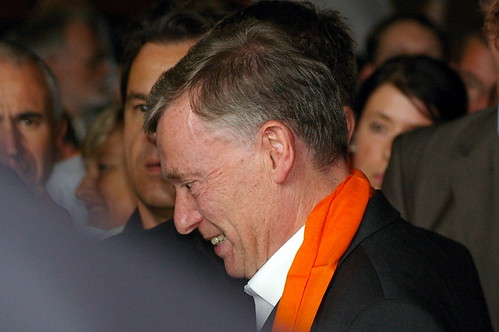Today, the German President Horst Köhler has resigned over a controversial interview he gave 9 days ago.
In the interview he said that an export-heavy economic power like Germany would need to be able to use the military to defend its economic interest, inter alia by keeping international trade routes free or by preventing regional destabilisation.
Because of the context these remarks are made, they have been interpreted as related to the German presence in Afghanistan (very unpopular in Germany) and may sound close to support of unconstitutional use of military forces (the German constitution only allows defensive use the army or actions within the UN framework).
Köhler feels that he has been misunderstood and that the public criticism regarding his remarks is damaging his office. I don't agree and rather think that his resignation is more of a damage than his remarks or the debate.
It shows that Köhler, in office since 2004 and re-elected in 2009 by the Federal Assembly, a joint body of the German Parliament and the representatives of the 16 federal states' parliaments, has never been a politician used to public debate. He went through a largely bureaucratic career that lead until his function as Director of the International Monetary Fund (IMF) before becoming German President.
How will this affect German EU policy?
In principle, the president doesn't have strong constitutional powers except for external representation and the signing of laws or the ratification of international treaties. These functions will now be taken over by the (rotating) President of the Bundesrat, the second chamber in which the governments of the federal states are represented. This is, right now, the mayor of the Free Hanseatic City of Bremen, the social democrat Jens Böhrnsen. The Constitution foresees a maximum 30 day period until the Federal Assembly has to elect a new president, so the transition will not be very long.
The resignation will thus not have much substantive influence on anything Germany does on the European level.
But the resignation means that, during the next month, Germany will be heavily dominated by an internal debate over who will be Köhler's successor. So far, Merkel's governmental coalition also holds a majority in the Federal Assembly, so the prospect for a Christian Democrat (Merkel's party) are not bad. But the question who will get this semi-political but still highest German office will lead to internal and public struggles within the political parties and within the governing coalition.
This may not be totally favourable to a concentrated German leadership in European and international fora, but I don't expect that this will pose real problems beyond the diversion of political and media attention from certain issues that may seem more important internationally or for the EU.
In summary, my conclusion is that we have seen a not-so-important German president resign unnecessarily over remarks that touched a very sensitive area in the German political system - international military presence - which, in my opinion, will lead to a short perturbation of the German political landscape but no to a political shift or mayor problem with European relevance.
Picture: tgoldkamp (flickr) / CC BY-NC-SA
Monday, 31 May 2010
Subscribe to:
Post Comments (Atom)


3 comments:
I disagree with regard to the "not-so important" president. Certainly he didn't have any official power in decision-making, but many people perceived him as one of the few politicians with a vision. Who of the current CDU politicians could replace such an integrative figure?
The "not-so-important" was meant especially seeing him in line with figures like Rau or von Weizäcker.
Köhler was integrative because he didn't have a political pre-history and because he didn't have the habits of a classical politician and I appreciated that.
But his actual influence and relevance for the German system after the decision to accept the resignation of the Schröder-government in 2005 were not so great, especially not when looking at the impact on German EU policies.
the voters are tired of politics, now the politicians are getting tired too? There has been a whole wave of resignations: Lafontaine, Koch, Köhler. Whose next?:)
Post a Comment